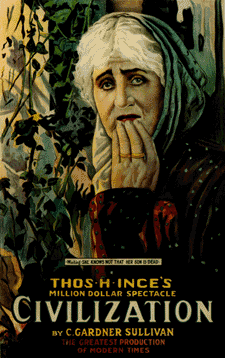Saturday, November 06, 2004
At the start of World War I cinema as a medium was still in its infancy and yet film propaganda was already playing an important role in rallying American support for the war effort. Posters and newspapers as means for forming public opinion were extremely limited in their geographical reach and thus rather inefficient, as opposed to the new 'feature film' format which allowed at once for entertainment and the transmission of a message to a mass audience. This audience was often an impressionable one, not yet accustomed to subtle cinematic technique, which let down its guard upon entering the cinema expecting only to be entertained, and which was therefore rather susceptible to influences of thought and opinion.
 Even before the United States officially joined the war in 1917, 'pre-propaganda' films were gradually instilling a sense of nativism , patriotism and fear of 'the foreign other' within the minds of the American people. These films were not coming from an official bureau of propaganda, but from studios intent on cashing in on the war driven adventure film. They presented a romanticized view of war as the backdrop for a simplistic 'good guy' versus 'bad guy' narrative.
Even before the United States officially joined the war in 1917, 'pre-propaganda' films were gradually instilling a sense of nativism , patriotism and fear of 'the foreign other' within the minds of the American people. These films were not coming from an official bureau of propaganda, but from studios intent on cashing in on the war driven adventure film. They presented a romanticized view of war as the backdrop for a simplistic 'good guy' versus 'bad guy' narrative.
While these films were effective in creating anti-German sentiment, they were often not forceful enough to break the general population's consensus that the US should remain neutral and not get involved in a war which was "not ours to fight".
 This slowly began to change as more and more British propaganda films began to be screened in American theatres, advocating that the US join the war as soon as possible. In 1916, this pro-war perspective had spawned a series of American films such as The Deserter and The Brand of Cowardice which questioned and criticized non-fighting Americans' patriotism.
This slowly began to change as more and more British propaganda films began to be screened in American theatres, advocating that the US join the war as soon as possible. In 1916, this pro-war perspective had spawned a series of American films such as The Deserter and The Brand of Cowardice which questioned and criticized non-fighting Americans' patriotism.
When the United States did join the war a year later, an official Committee on Public Information was formed which oversaw most feature film production dealing with the conflict. This resulted in films like The Claws of the Hun and The Beast of Berlin which easily moulded the familiar good guy/bad guy dichotomy into the more specific good American/evil German.
The Birth of a Nation(1915)
Starring: Lillian Gish, Henry B. Walthall
Directors: D.W. Griffith

Civilization (1916)
Starring: Howard C. Hickman
Directors: Reginald Barker, Thomas H. Ince, Raymond B. West

Joan the Woman (1917)
Starring: Geraldine Farrar
Directors: Cecille B. DeMille

 Even before the United States officially joined the war in 1917, 'pre-propaganda' films were gradually instilling a sense of nativism , patriotism and fear of 'the foreign other' within the minds of the American people. These films were not coming from an official bureau of propaganda, but from studios intent on cashing in on the war driven adventure film. They presented a romanticized view of war as the backdrop for a simplistic 'good guy' versus 'bad guy' narrative.
Even before the United States officially joined the war in 1917, 'pre-propaganda' films were gradually instilling a sense of nativism , patriotism and fear of 'the foreign other' within the minds of the American people. These films were not coming from an official bureau of propaganda, but from studios intent on cashing in on the war driven adventure film. They presented a romanticized view of war as the backdrop for a simplistic 'good guy' versus 'bad guy' narrative.
While these films were effective in creating anti-German sentiment, they were often not forceful enough to break the general population's consensus that the US should remain neutral and not get involved in a war which was "not ours to fight".
 This slowly began to change as more and more British propaganda films began to be screened in American theatres, advocating that the US join the war as soon as possible. In 1916, this pro-war perspective had spawned a series of American films such as The Deserter and The Brand of Cowardice which questioned and criticized non-fighting Americans' patriotism.
This slowly began to change as more and more British propaganda films began to be screened in American theatres, advocating that the US join the war as soon as possible. In 1916, this pro-war perspective had spawned a series of American films such as The Deserter and The Brand of Cowardice which questioned and criticized non-fighting Americans' patriotism.
When the United States did join the war a year later, an official Committee on Public Information was formed which oversaw most feature film production dealing with the conflict. This resulted in films like The Claws of the Hun and The Beast of Berlin which easily moulded the familiar good guy/bad guy dichotomy into the more specific good American/evil German.
The Birth of a Nation(1915)
Starring: Lillian Gish, Henry B. Walthall
Directors: D.W. Griffith

Civilization (1916)
Starring: Howard C. Hickman
Directors: Reginald Barker, Thomas H. Ince, Raymond B. West

Joan the Woman (1917)
Starring: Geraldine Farrar
Directors: Cecille B. DeMille

